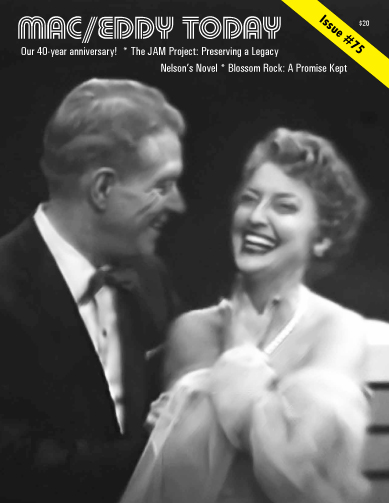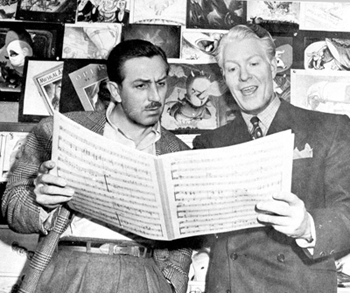We received an email from Joe Kennedy that you should find informative. Thank you, Joe!
Dear Ms. Rich,
I have followed your writings for some years and am always impressed by the diligence and dedicated research that you and your colleagues have made into the lives and careers of Jeanette MacDonald and Nelson Eddy. As someone who has done research for authors, I appreciate the difficulty of tracking down often-obscure sources.
I recently came across some information in a biography of Wilfred Jackson, a Disney director, that may be of interest to you. As I am sure you know, in 1946 Nelson Eddy recorded all the voices for a Disney short cartoon “The Whale who Wanted to Sing at the Met,” which was part of a compilation feature, Make Mine Music.
In 1959, Disney planned to use this short in an episode of the Disneyland television series on opera, and Wilfred Jackson was the director of the program. At some point in the planning stage, it was suggested that they bring in Nelson Eddy to host the show.
Jackson’s personal notes are reproduced in the book, and he records his excitement at the idea of working with Eddy. Mr. Eddy was apparently very busy in early 1959, and as a result, he was not able to meet with the Disney team for some months.
Finally, a date was set, and Nelson Eddy came to lunch at the studio with Walt Disney and the director. And after all the months of buildup, Walt Disney suddenly decided after lunch to drop the idea of using Eddy altogether, for reasons unspecified. He instructed the director to come up with another concept.
It’s too bad that it did not happen, as I imagine Nelson Eddy might have demonstrated the multi-channel recording equipment that enabled him to sing in harmony with himself.
In any event, I though you might like to have a copy of Jackson’s notes, which are transcribed in his biography and also reproduced in their original form. You will be amused at Jackson’s growing excitement and ultimate disappointment. it is a very slight bit of anecdotal information, but perhaps it will add to your existing knowledge about Eddy’s later career.
There is also another story about Disney and Nelson Eddy, which dates back to the 1946 recording sessions for the film. (I’m sorry but I do not have the source for this story handy. However, I will try to find it if you are interested.)
The director of the sequence, Ham Luske, was known to be completely tone deaf. He and Nelson Eddy played a joke on Walt Disney. When Disney sat in on one of the recording sessions, Nelson Eddy sang perfectly, but Luske kept interrupting him, telling him he was off-key, or that he hadn’t hit the right note. Eddy would apologize and do another take, again perfectly, and Luske would again ‘correct’ him.
Walt Disney sat watching this interaction with growing indignation, and finally stopped the director, telling him that Nelson Eddy is a great artist, and he had no right to try to criticize his performance. Everyone in the room burst into laughter, and Walt was furious that he had been made the butt of this joke. Supposedly he never forgave the director, and who knows, maybe that was an unconscious part of his decision to drop Nelson Eddy from the television program!


